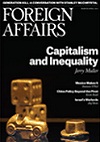Deterrence isn’t what it used to be. In the second half of the twentieth century, it was the backbone of U.S. national security. Its purpose, logic, and effectiveness were well understood. It was the essential military strategy behind containing the Soviet Union and a crucial ingredient in winning the Cold War without fighting World War III. But in recent decades, deterrence has gone astray, and U.S. defense policy is worse for the change.
Since the Cold War ended, the United States has clung to deterrence where it should not have, needlessly aggravating relations with Russia. More important, it has rejected deterrence where it should have embraced it, leading to one unnecessary and disastrous war with Iraq and the risk of another with Iran. And most important, with regard to China, Washington is torn about whether or not to rely on deterrence at all, even though such confusion could lead to a crisis and a dangerous miscalculation in Beijing.
This article was originally published by Foreign Affairs. You can read the rest of the article here.
You can read exclusive content from Gateway House: Indian Council on Global Relations, here.
Copyright © 2013 by the Council on Foreign Relations, Inc.


